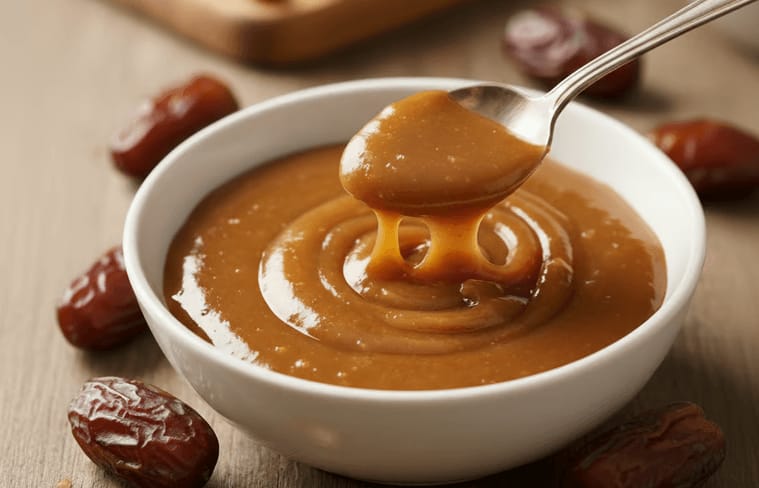- Thriving Guide
- Posts
- Is Date Caramel a Healthier Alternative to Coffee Creamer
Is Date Caramel a Healthier Alternative to Coffee Creamer
This natural sweetener is full of nutrients and fiber but here’s what to know before swapping it into your morning cup.

If you're looking for a more natural way to sweeten your coffee, date caramel might already be on your radar. Made by blending Medjool dates with coconut milk, vanilla, cinnamon, and a pinch of salt, this thick, golden paste has become a popular swap for store-bought creamers.
But is it actually a healthier choice? That depends on what you're comparing and your personal health goals.
What’s in Date Caramel?
A basic date caramel recipe blends:
15 Medjool dates
½ cup coconut milk
1 tsp vanilla extract
1 dash cinnamon
A pinch of salt
The result? A sweet, creamy paste that can be stirred into coffee just like flavored creamer.
According to Stephani Johnson, DCN, RDN, a clinical nutrition expert at Rutgers University, two tablespoons of date caramel contain:
108 calories
29 grams of carbohydrates, including 24 grams of natural sugar
3 grams of fiber
Minimal fat and protein
Date Caramel vs. Traditional Coffee Creamers
When it comes to nutrition, both options have trade-offs.
Coffee creamers especially flavored or sugar-free varieties are typically:
Lower in calories (around 60–70 per 2 tablespoons)
Often higher in saturated fats
May contain artificial flavors, emulsifiers, and thickeners
Sugar-free versions might use artificial or non-nutritive sweeteners
Date caramel, on the other hand:
Contains no artificial ingredients
Is high in natural sugars, but also rich in fiber and antioxidants
Provides trace amounts of vitamins and minerals (like potassium, magnesium, and vitamin B6)
Is plant-based and suitable for many dietary preferences
Why Dates Are a Nutrient-Dense Sweetener
Despite their natural sweetness, dates have a low glycemic index, meaning they don't spike blood sugar levels the way refined sugar or candy might. That’s partly due to their fiber content, which slows digestion and sugar absorption.
Dates are also packed with:
Potassium and magnesium for heart health
Calcium and phosphorus for bones
Vitamin B6 to support brain function
Flavonoids and carotenoids antioxidants that protect against oxidative stress and inflammation
According to Rabia De Latour, MD, a gastroenterologist and assistant professor at NYU Grossman School of Medicine, dates are particularly beneficial for gut health and immune support.
But Is It Actually Healthier?
“Healthy” is a nuanced term. What’s beneficial for one person might not be ideal for another.
If you're managing heart health: Date caramel is free from saturated fat, making it a good alternative to half-and-half or cream.
If you're managing blood sugar: Be cautious date caramel still contains a significant amount of sugar, even if it's natural. One tablespoon of date caramel adds about 12 grams of sugar to your coffee.
If you drink multiple cups daily: The sugar and calorie count can add up quickly.
“The sugar content is something to watch, especially for people with diabetes or those trying to reduce their overall sugar intake,” Johnson noted.
Bottom Line
Date caramel can be a more wholesome alternative to traditional creamers, especially if you're aiming for fewer additives and more plant-based ingredients in your diet. It's naturally sweet, rich in fiber, and full of micronutrients but it’s still a concentrated source of sugar.
As with most things, moderation matters. If you enjoy the flavor and want a nutrient-rich way to sweeten your coffee, a small spoonful of date caramel can be a delicious, functional upgrade.
Share this article or subscribe to our newsletter for more healthy swaps and food insights.